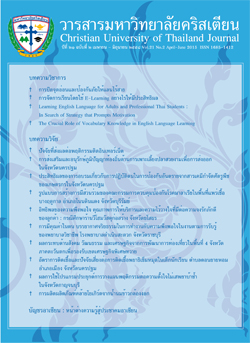ความสำคัญของความรู้เกี่ยวกับคำศัพท์ในการเรียนภาษาอังกฤษ
บทคัดย่อ
บทความนี้กระตุ้นให้ตระหนักถึงความสำคัญของคำศัพท์ในภาษาอังกฤษในทั้ง 4 ทักษะ อันประกอบไปด้วยทักษะการฟัง ทักษะการพูด ทักษะการอ่านและทักษะเขียน โดยจากการศึกษาและค้นคว้าข้อมูลจากนักวิจัยหลายท่าน พบว่า การรู้คำศัพท์ในภาษาอังกฤษนั้นจะช่วยให้ผู้เรียนแต่ละคนประสบความสำเร็จในการเรียนทางด้านวิชาการ นอกจากนี้ บทความยังเน้นย้ำเรื่องการสอนคำศัพท์ภาษาอังกฤษในชั้นเรียน เนื่องจากคำศัพท์เป็นปัจจัยสำคัญของการเรียนรู้ภาษา โดยเฉพาะเด็กไทยและเด็กอื่นๆที่เรียนภาษาอังกฤษเป็นภาษาที่สองหรือภาษาต่างประเทศ
เอกสารอ้างอิง
Bonk, W. (2000). “Second language lexical knowledge and listening comprehension”. International Journal of Listening. (14) : 1-31.
Chuenjit, T. (2011). The influence of vocabulary knowledge on the english listening comprehension of Thai Hospital Pharmacists. [Online]. Retrieved May 15, 2014 from, http ://digi.library .tu.ac.th/thesis.
Corona, Cathy, Spangenberger, Sandra, &Venet, Iris. (1998). Improving student writing through a language rich environment. M.A. action research project. St. Xavier University and IRI/Skylight.
Fan, M.Y. (2003). “Frequency of use, perceived usefulness, and actual usefulness of second language vocabulary strategies: A study of Hong Kong learners”. [Online]. The Modern Language Journal. 87(2) : 222-241. Retrieved May 17, 2014 from, http: //doi.org/10. 1111/1540- 4781.00187
Goh, C. (1999). “How much do learners know about the factors that influence listening comprehension?”. Hong Kong Journal of Applied Linguistics. 4(1) : 17-41.
Graves, M.F. (2006). The vocabulary book: Learning and instruction. Teachers College Columbia University.
Kelly, P. (1991). “Lexical ignorance : The main obstacle to listening comprehension with advanced foreign language learners”. IRAL, 39(2) : 135-149.
Koizumi, R. (2005). Predicting speaking ability from vocabulary knowledge. [Online]. Retrieved June 15, 2014 from, www. academia. edu.
Komol, T. & Sripetpun, W. (2011). Vocabulary learning strategies employed by undergraduate students and its relationship to their vocabulary knowledge. The 3rdInternational Conference on Humanities and Social Science. 1-18.
Liangpanit, C. (n.d.). Vocabulary learning strategies for Thai learners : Research to practice. [Online]. Retrieved May 30, 2014 from, www. huso.tsu. ac.th.
Martinovic, D. (2013). Focusing on vocabulary instruction: will it advance reading comprehension?. [Online]. Retrieved September 19, 2013 from, https://search.proquest.com/
Mayher, J.S., &Brause, R.S. (1986). “Learning through teaching : Is testing crippling integrated language education?”. Language Arts. 63(4) : 390-96.
Meccarty, F. (2000). “Lexical and grammatical knowledge in reading and listening comprehension by foreign language learners of spanish”. Applied Language Learning. 11(2) : 323-348.
Moseley, D. S. (2003). Vocabulary instructions and its effects on writing quality.[Online]. Retrieved May 29, 2014 from, www.proquest.com.
National Reading Panel (NRP). (2000). Report of the national reading panel. Teaching children to read : An evidence-based assessment of the scientific research literature on reading and its implications for reading instruction. Washington, DC : National Institute of Child and Human Development.
Nouralian, R., Jahandar, S.,&Khodabandehlou, M. (2013). The influence of vocabulary knowledge on iranian intermediate EFL learners' speaking ability. [Online]. Indian Journal of Fundamental and Applied Life Sciences. 3(3) : 188-192. Retrieved June 10, 2014 from, https://www.cibtech.org/jls.htm.
Papadopoulou, E. (2007). The impact of vocabulary instruction on the vocabulary knowledge and writing performance of third-grade students. [Online]. Retrieved June 10, 2014 from, wwwproquest.com
Qian, D. (1998). Depth of vocabulary knowledge : Assessing its role in adults reading comprehension in english as a second language. [Online]. Retrieved July 25, 2013 from, https://search.proquest.com
Rupley, W. H., Logan, J. W., & Nichols, W. D.(1998/99). “Vocabulary instruction in a balanced reading program”. The Reading Teacher, 52(4). p- p.
Ryder, R. J. & Graves, M. F. (1994). “Vocabulary instruction presented prior to reading in basal readers”. The Elementary School Journal. (95) : 139-153.
Sedita, J. (2005). “Effective vocabulary instruction”. Insights on Learning Disabilities. 2(1) : 33-45.
Sinpho, D. (1999). The role of active vocabulary in the development of the reading comprehension of diploma-level technical students. Mahidol University.
Staehr, L. S. (2009). “Vocabulary knowledge and advanced listening comprehension in english as a foreign language”. Studies in Second Language Acquisition. 31(4) : 577-607.
Stahl, S & Fairbanks, M. (1986). “The effect of vocabulary instruction : A model meat-analysis”. Review of Educational Research. (56) : 72-110.
Su, S. (2007). A study of authentic materials as a teaching resources in an adult ESL program. Retrieved June 15, 2014 from, www.spalding.edu.
Tangpermpoon, T. (2008). “Integrated approaches to improve students writing skills for english major students”. ABAC Journal. 28(2) : 1-9.
Wilkins, D. (1972). Linguistics in language teaching. London : Arnold.



